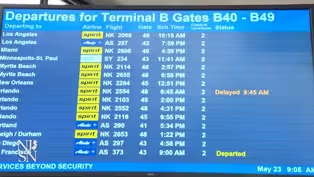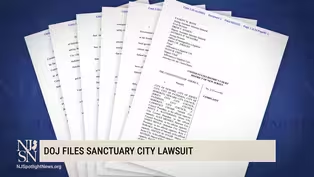NJ Spotlight News
Abuse, neglect documented in NJ's group homes
Clip: 5/23/2025 | 11m 53sVideo has Closed Captions
Interview: Ashley Balcerzak and Jean Rimbach, reporters with The Record/NorthJersey.com
A new investigative project by reporters Ashley Balcerzak and Jean Rimbach at NorthJersey.com delved into the state’s privately run group home system that provides care for some 8,000 adults with intellectual and developmental disabilities. What they documented in their "Hidden at Home" series was alarming.
Problems playing video? | Closed Captioning Feedback
Problems playing video? | Closed Captioning Feedback
NJ Spotlight News is a local public television program presented by THIRTEEN PBS
NJ Spotlight News
Abuse, neglect documented in NJ's group homes
Clip: 5/23/2025 | 11m 53sVideo has Closed Captions
A new investigative project by reporters Ashley Balcerzak and Jean Rimbach at NorthJersey.com delved into the state’s privately run group home system that provides care for some 8,000 adults with intellectual and developmental disabilities. What they documented in their "Hidden at Home" series was alarming.
Problems playing video? | Closed Captioning Feedback
How to Watch NJ Spotlight News
NJ Spotlight News is available to stream on pbs.org and the free PBS App, available on iPhone, Apple TV, Android TV, Android smartphones, Amazon Fire TV, Amazon Fire Tablet, Roku, Samsung Smart TV, and Vizio.
Providing Support for PBS.org
Learn Moreabout PBS online sponsorshipfinally tonight we're devoting this part of our broadcast to a new investigative project by reporters at northj jersey.com hidden at home delves into the state's privatelyun group home system that provides care for some 8,000 adults with intellectual and developmental disabilities what they found was alarming a system largely left to police itself where a lack of accountability can have devastating results for its residents people with conditions like cerebral pausy down syndrome and autism who in some cases were left to die alone in avoidable ways people who weren't provided basic care like being given food water or medical attention abuse and medical errors that led to disturbing injuries or death along with group home staff who are overburdened and underpaid tonight we'll talk to the reporters who produced the series but first here's a look at some of the stories they uncovered and a warning you may find some of these images disturbing i could see the bruises on adam's arms and his chest i was told by a manager that adam took the staff's lunch and the staff got upset because my son doesn't articulate his words because that's part of his disability how come he's wrong and why wasn't the staff wrong the doctor come outside and says "uh tam selby has been being abused."
she was like "yeah this is like a stomp marks like somebody was stomping her ribs."
i called the group i said "well somebody stomp my sister this is what the doctors are saying."
the supervisor was like acting real funny she just said she don't know what happened i want to see somebody prosecuted for that the cops said they couldn't do nothing because nobody said anything there was two police officers we're sorry for your loss your son billy died in his group home and he said billy was found on the floor of his closet in the closet face down on a bloody pillow you don't get over it and it's unfair that this happens it's not right we had many meetings with a whole group of people at the table and very nicely said "this is what's wrong this is what we need to fix."
but they it didn't happen from the top down everyone's got a very important job to do they have somebody's life in their hand rachel was 34 and she should still be here in the span of less than two days we went from optimism the start of something new to a terrible ending i um i held her when she was born and i buried her that's that's something i'm going to live with for the rest of my life who else is here how many people how many other people are in there i got to see how one there's one more so as we can finding a spot i show you the across the screen and stay with the people okay no just me just me to produce the series reporters ashley ballzerac and gene brimach spent a year filing hundreds of public records requests interviewing hundreds more family members providers group home staff and residents with developmental disabilities many of their efforts were blocked by the state department of human services which oversees the $ 1.5 billion system and many of the stories remain untold either out of fear of retribution or because the group home residents are unable to speak for themselves ashley gan thank you both so much for coming on the show to share this gan let me start with you um i know that you sifted through thousands of documents made a lot of requests for public information can you just walk us through some of the patterns that you uncovered in terms of what would be considered abuse and neglect it's interesting you use the word pattern because that's exactly what we started to find as we went along and that's what sort of was so striking about putting this story together um the more families we talked to the more documents we read we kept coming up with the same things happening the same lapses in basic care um people not being cleaned um people not getting proper medication um people not having um diapers changed incontinence underpants changed not getting the food they needed getting too much of the wrong food not being taken to doctors not being taken to doctors in a timely manner not getting to dentists and finding their teeth rotted um all of these same kinds of complaints kept coming up o over and over again um those are just the kinds of things you would think of as basic care and then we also found that families were keeping a cat um sort of a catalog of injuries that they found um many of them were sharing photos with us some of them which you can see appeared online and in print in our stories um burns bruises um uh stitches uh all kinds of things that were happening to their loved ones many of them unexplained and those that were investigated many of them unsubstantiated i mean ashley jean says the families were keeping cataloges were the group homes also keeping logs of these and what really stuck out to you there was a man in particular you wrote about michael lombardi who had um what looked like some pretty terrible injuries um were the group homes keeping track so under the law you need to report um uh abuse or neglect um with michael lombardi that's a really interesting case um some of the photos that you see were at a previous group home and then uh he moved to another company and a couple of months there um he died unexpectedly at the age of 39 and um his mother uh called around to as many people as she could think of uh because she didn't understand what had happened and it took a full year for the state to open an investigation into his death um that's despite uh them informing the state that his cell phone had showed that he had tried to call 911 more than a dozen times um so it took a year uh eventually the state wrote um an investigation report um it was unsubstantiated neglect uh the mother had a lot of questions about how you could do an investigation like this a year later when memories may have faded and um so much had had gone on yeah and why why is it ashley that the state doesn't automatically investigate this especially as you both point out in your reporting that about a quarter of these deaths are labeled as other you know whatever that means it's a great question and it's uh one we'd love if you ask the state as well what they say is they conduct um a mortality review of everyone um donbudsman paul aronson calls those cursory uh what we do know is about 170 people under group home care die each year and 120 are um unexpectedly so that means that they're not in hospice or paliotative care and then from that only about 10% um of deaths are investigated so it's it's a question that really comes up a lot with families where someone has died very young unexpectedly um maybe had questions about their care that led them to be hospitalized or um put into hospice at a very young age so that that's something that we really would like to understand why the process is yeah gan i mean are there punishments for these group homes when cases of neglect abuse or or the deaths are substantiated i mean what type of repercussions are there if any well most of the the investigative reports are not public so um the ones that ashley and i were able to obtain um we you know we had to get through families or other means and there are corrective action plans that are required off of you know investigations um that go into uh these cases of abuse and neglect but also those corrective action plans are not public so you can't you you often can't see what happened if a staff has been disciplined that is also not public if they land on what is known as the central registry the names on that central registry are also not public so as you can see here there's a a significant lack of transparency in the system and that's only some of the things that you can't get your hands on i mean we should also note right gene these folks who work at these group homes these are difficult jobs um they are drastically underpaid um and often short staffed i mean how does that leave folks who already many of whom can't advocate for themselves even more vulnerable in what is a vulnerable system it the the staffing issue is huge for this system um you as you said brianna there are a lot of people everybody is significantly underpaid training is an issue like what we're talking about training i mean hands-on training is an issue for these staff members many of them feel like they're thrown into the job they're left alone they're not given the support they need and there are a lot of good people out there on the front lines trying to do good work at the same time because the companies have trouble attracting good people they have a tendency to take whatever ever is out there and that's how you get bad actors that sneak into the system well they don't really sneak in they're just they're just brought in people that are not really equipped for the job because we're not upfront with them and we see how this lack of staffing this lack of training leaves residents vulnerable i mean residents do not get the support they need some of them need one-on-one they need assistance they don't get it because there aren't enough staff in in one of our stories we wrote about a woman who was left alone um with four disabled residents when the house caught fire and she had a struggle to rescue these women um one of them she wasn't able to get out and had to wait for the uh firefighters to uh bring her out of a of structure that was completely destroyed so this is just some of the um the things that we saw with staff yeah and as you said that's with um the information you were able to get your hands on um you can read ashley and jean's full series on north jersey.com ashley ballserac and jean rimach thank you so much this is really important reporting um thanks for sharing it with us thank you so much support for the medical report is provided by horizon blue cross blue shield of new jersey an independent lency of the blue cross blue shield association
Delays continue at Newark airport before holiday weekend
Video has Closed Captions
Clip: 5/23/2025 | 5m 6s | Over 100 flights were delayed Friday morning as FAA reduces flights to and from Newark (5m 6s)
DOJ files lawsuit against 'sanctuary' cities in New Jersey
Video has Closed Captions
Clip: 5/23/2025 | 1m 11s | Lawsuit names Newark, Jersey City, Hoboken and Paterson (1m 11s)
How lawmakers are targeting energy rate increases
Video has Closed Captions
Clip: 5/23/2025 | 5m 16s | Bills seek to require more energy production and storage (5m 16s)
Providing Support for PBS.org
Learn Moreabout PBS online sponsorshipSupport for PBS provided by:
NJ Spotlight News is a local public television program presented by THIRTEEN PBS














